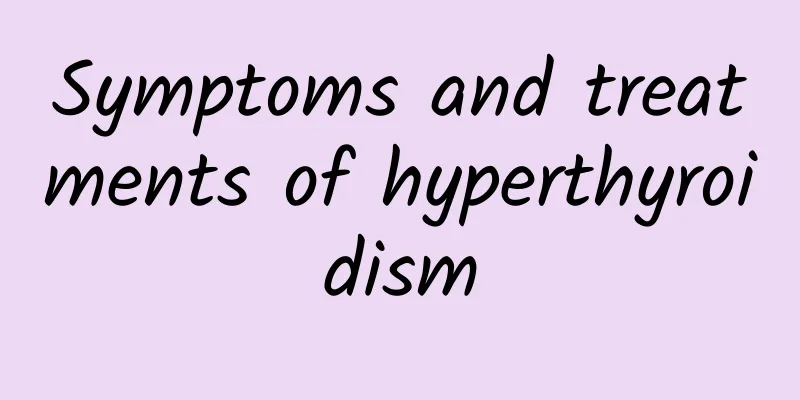Symptoms and treatments of hyperthyroidism

|
Hyperthyroidism is a very common disease in clinical practice. Many people usually discover the symptoms of hyperthyroidism from its symptoms. Therefore, the following article introduces the common symptoms and treatment methods of hyperthyroidism. Symptoms of hyperthyroidism: Thyroid hormone promotes metabolism and the body's redox reaction. Hypermetabolism requires the body to increase food intake; gastrointestinal activity is enhanced, and the frequency of bowel movements increases. Although food intake increases, oxidation reactions are enhanced, the body's energy consumption increases, and patients experience weight loss; increased heat production manifests as heat intolerance and sweating, and some patients experience low fever; increased thyroid hormone stimulates sympathetic nerve excitement, and clinical manifestations include palpitations, tachycardia, insomnia, sensitivity to surrounding things, mood swings, and even anxiety. Hyperthyroidism patients who do not receive proper treatment for a long time will suffer from weight loss and hyperthyroid heart disease. Weight loss patients are often prone to acute infectious diseases, which can lead to disability or death. Hyperthyroid heart disease causes heart enlargement, arrhythmia, atrial fibrillation and heart failure, and patients lose their motivation and even die. Treatment for hyperthyroidism: There are three ways to treat hyperthyroidism: antithyroid drug therapy, radioactive iodine therapy and surgical treatment. Antithyroid drugs are widely used for treatment of hyperthyroidism, whether it is adults or children, men or women, mild or severe hyperthyroidism, first-time or recurrent hyperthyroidism, and pregnant or breastfeeding women. There are two types of antithyroid drugs: imidazoles and thiouracils. The representative drugs are methimazole (also known as "thiouracil") and propylthiouracil (also known as "propionylthiouracil"). Drug therapy is suitable for pregnant women with hyperthyroidism, children, and patients with mild thyroid enlargement. Treatment generally takes 1 to 2 years, and the dosage of the drug needs to be increased or decreased according to the thyroid function during treatment. Drug therapy has some side effects, including granulocytopenia, drug allergy, liver damage, joint pain, and vasculitis. In the early stages of drug treatment, the side effects of the drug need to be closely monitored, especially granulocytopenia. Patients need to be warned that if they develop fever and/or sore throat, they need to check their granulocytes immediately to determine whether granulocytopenia occurs. If it occurs, stop the drug and go to the emergency department immediately. Another disadvantage of drug therapy is the high recurrence rate after discontinuation of the drug, which is about 50%. Both radioactive iodine therapy and surgical treatment are destructive treatments. Hyperthyroidism is not likely to recur and treatment only needs one time. Radioactive iodine is suitable for patients with moderate thyroid enlargement or recurrent hyperthyroidism. Doctors calculate the amount of radioactive agent required for each patient based on the patient's thyroid's absorption rate of radioactive iodine. Radioactive iodine is an absolute contraindication for pregnant and breastfeeding women. Because the effect of radioactive iodine has a delayed effect, the incidence of hypothyroidism increases by 3% to 5% per year over time. Radioactive iodine treatment is not suitable for hyperthyroid patients with thyroid eye disease because the eye disease may worsen after treatment. Surgical treatment is suitable for those with significant thyroid enlargement, or those who are highly suspected of thyroid malignancy, or those whose thyroid enlargement compresses the trachea and causes breathing difficulties. Before surgery, medication is needed to control thyroid function within the normal range, and oral compound iodine solution is also required as preoperative preparation. |
>>: What are the causes of low or high blood pressure? What are the symptoms?
Recommend
Causes of prostate calcification
The prostate plays a very important role for male...
What is the normal length of a male penis?
For women, they care a lot about their body shape...
Does running in the morning help you lose weight? The method affects the weight loss effect
People's lives are getting better and better ...
What causes hair loss on the top of the head in men?
In fact, once a man has a hair loss problem, it i...
Can eating bananas improve male sexual performance?
Bananas are a fruit that we are all familiar with...
A brief discussion on the treatment of prepuce
Phimosis is a physiological problem faced by men....
The benefits of leg training for improving sexual function
In modern society, male sexual dysfunction is bec...
Penis enlargement surgery
The size of the penis is affected by many factors...
How to lose fat on the back? Three tips will do the trick
It is said that women can show off their beautifu...
Normal height for a 13-year-old boy
Height refers to the length of the vertical part ...
Does testosterone cause hair loss?
There are many factors that cause hair loss, whic...
How to remove bruises on legs, eight quick ways to remove them
I believe many people have had this experience. W...
What are the symptoms of perianal abscess?
We know that the rectum is close to the anus, and...
What does testicular cramping feel like?
Testicular cramps are mainly caused by testicular...
The efficacy and function of coriander can dispel cold and aid digestion
Coriander is actually the cilantro we often eat. ...









